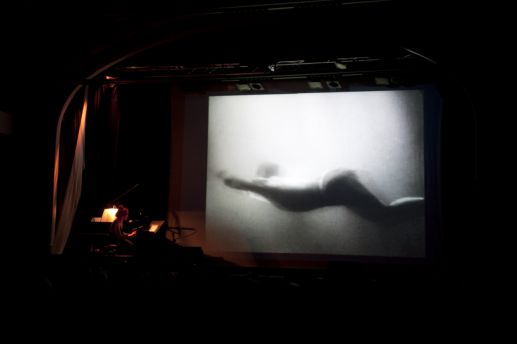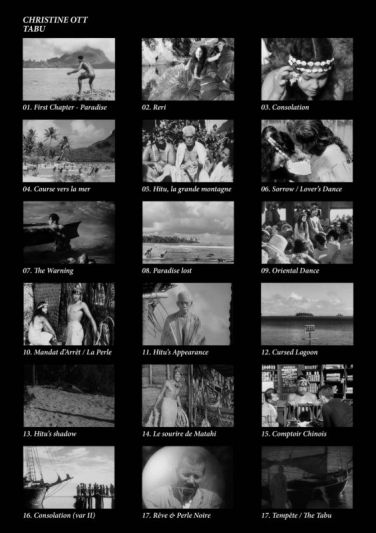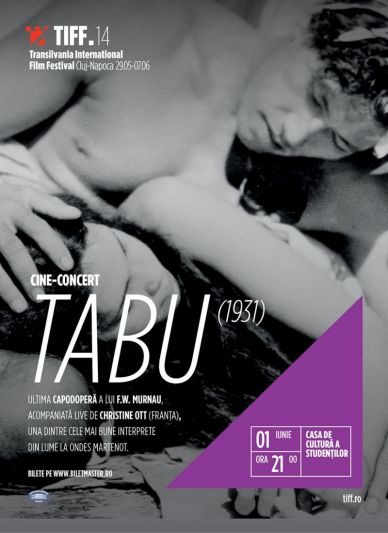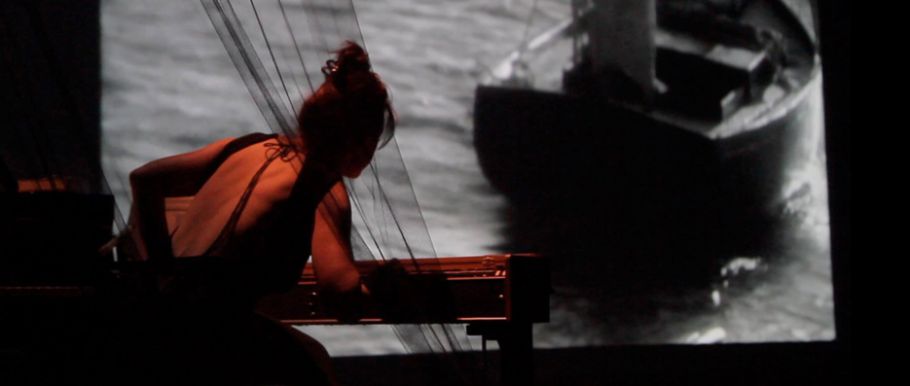




Bora-Bora, an enchanting island in a tropical paradise. Matahi, a pearl fisherman, is passionately in love with the beautiful Reri, but Hitu, the tribe's all-powerful priest, has other plans for her: he demands that Reri be consecrated guardian of the temple of the gods. From now on, she is "taboo". Fleeing their paradise seems to be the only way out for the lovers...
Co-directed by the famous documentary filmmaker Robert Flaherty, "Tabu" was the last film by Murnau, who died in a car accident a few days before its premiere. "Tabu" is a naturalistic fable of rare intensity, in which innocence and carefreeness disappear, like a lost paradise...
"When you leave the Tabou film-concert, there can be no doubt: there is indeed a secret link between Reri, daughter of the water, and Christine, sister of the waves (...) In those pure moments when Christine Ott's piano becomes a waterfall, a river and an ocean. In those heart-rending moments when the musician, without ever overdoing it or redundantly illustrating, draws from a mysterious and fascinating instrument the tears that the spectator does not always dare to shed. The film recreates itself before our very eyes. We are all going to fish for pearls in Paradise (...) Under Christine's fingers, Eden has found its sea again. It's gone with the sun". Thierry Méranger, Les Cahiers du Cinéma
ATTN: Your piano playing has a fluid, cascading quality to it; the speed and volume is always in free-flow. Personally I hear a certain likeness to the emotive undulations of human speech and human movement. Are these written into the music, or is there room left for impulse to drive the tempo and intensity of the pieces?
CO: Yes. This freedom and fluidity in playing piano is in fact very much linked to images, and very linked to the water themes. So the rhythm of my playing is set by the waterfalls, the waves, the water flow. But I didn’t note this in the score, except some particular ralenti or accelerando. It’s only given by the movie. The interpreter has to adapt his playing to the images.
ATTN: You worked with hang-player Torsten Böttcher for this release. He puts in a beautiful performance on the 10-minute “Sorrow / Lover’s Dance”, which has this sense of “quiet viscera” to it. What was it like working with Torsten, and what made the hang such a suitable instrument for this work?
CO: It was a beautiful meeting with Torsten, who seemed to “fall from the sky” to me. In fact I had almost all the musical framework for Tabu after the days of solo improvisation and composition except three chapters: the first apparition of Reri, in the middle of tropical plants, and the dances. When I met Torsten he was playing as a minstrel in the streets of Strasbourg. He was playing hang – you know, this melodic percussion that looks like a flying saucer. I listened to him and I immediately know his instrument would give the perfect colour to represent the beauty and gentleness of Reri. A very particular colour in fact. (...) Since then, we have become good friends. We have since had the chance to create another work together, for the International Film Festival of La Rochelle, on the movie Nanook of the North.
ATTN: I’ve heard another soundtrack for Tabu which is much more orchestral and bombastic. The film feels entirely different. Has producing your own score reframed your relationship with the film?
CO: As I was searching for an existing movie to do a soundtrack on, I switched off the sounds and music in order to not be influenced. So it might sound strange, but as I had not seen Tabu before, I first watched it in silence. So there was nothing to redefine. It was easier for me. I built my relationship as I played on it. Then, I discovered after the original soundtrack. Ah! That’s quite different for sure! (...)
PAST SHOWS : 2012, Relais culturel de Thann - Festival Augenblick / Salle du Cercle - Bischheim // 2013, Cinéma d'Erstein / Festival du film français de Tübingen (Allemagne) / Musée d'art moderne de Strasbourg / Festival international du film français de La Rochelle / Centre culturel de Kinneksbond (Luxembourg) / Festival du film d'Anères // 2014 - Lille - Plein air place de la République / Cinéma Le Balzac - Paris // 2016, La MAC, Bischwiller / La passerelle, Rixheim // 2015, TIFF Transylvania International Film Festival - Cluj-Napoca (Roumanie) / Théâtre de Dreux // 2017, Leeds International Film Festival / Festival Voix de femmes, Liège / Ouistréham Jazz Escales / Les Tanzmatten, Sélestat / Cinéma de St Gratien // 2018, Toulon, Festival International des Musiques d'Écran // 2022, Mont Saint Aignan, Espace Marc Sangnier // 2024, TivoliVredenburg Utrecht
INTERVIEW by ATTN:MAGAZINE (excerpts) :
ATTN: I understand that the film Tabu had quite a profound effect on you. When did you first see the film, and how did you come to the idea of developing a live soundtrack for it?
CHRISTINE OTT: Yes, Tabu has and still have a profound effect on me. I was deeply moved and shattered by the fantastic and unusual love story and, at the same time, impressed by the beauty of the light. I saw the film first in 2012, and it was a special moment of my life for me. At this moment, my life looks like a sort of mirror of the film…a sort of “Paradise lost”. (...)
ATTN: How did the writing and recording process work for your score?
CO: From the moment I chose the film, everything went very quickly. I worked four days at the conservatory of Strasbourg where I currently work as a teacher. I installed all the stuff I imagined for the soundtrack: the Ondes Martenot, the piano, all percussions I thought would work for all the sound effects. A good sound engineer agreed to accompany me in this residency and to record everything.
Of course, I had analysed the scenario before, and thought about a plan for working. The original idea was to first record my improvisations chapter by chapter. These improvisations were totally free and totally spontaneous, and it came so quickly and easily compared to the month I spent afterward notating all of the recordings! I have to say I’m not very good at transcription work. Finally I recorded all the ideas for the score in three days.
I had chosen to work as though it were an opera score, with leitmotivs for the main characters (Matahi, Reri, Hitu). I added another main theme, the one for the sea. In this movie, I feel the sea as a character in itself. The sea, or maybe the water in general…successively the waterfall, the run to the sea, to the boat, or the end tempest. I thought I would keep this work and that I would only play it as a live soundtrack. (...)
ATTN: I’m always intrigued as to how a filmscore composer handles the negotiation between sound and image. Many of my favourite soundtracks demonstrate an understanding of where to drop back to give the visual element plenty of room, and when may be suitable to push to greater levels of intensity. How did you find the experience of finding this balance for Tabu?
CO: I think this is important for the composer to understand the power of the images in order to not make it clumsy. It has to build a whole thing; the music has to not be preponderant, or and sometimes has to fit in with the dynamic of the show. As for Tabu, the last chapter is as a climax, and this is a part of the ciné-concert in which I like to play very strong, very punk, just as the movie and the story is!
The movie is the conductor! For the intentions, the energy, but also for the tempi to use, the dynamic. Then I think there are no rules. Each movie gives its own life to the composition.



Bora-Bora, une île enchanteresse dans le paradis tropical. Matahi, pêcheur de perles, aime passionnément la belle Reri, mais Hitu, prêtre tout puissant de la tribu, a d’autres projets pour elle : il exige que Reri soit consacrée gardienne du temple des Dieux. Désormais, elle est « tabou ». La fuite hors de leur paradis semble être la seule issue pour les amoureux...
Co-réalisé par le célèbre documentariste Robert Flaherty, Tabou est le dernier film de Murnau qui disparaît dans un accident de voiture quelques jours avant la Première. Tabou est une fable naturaliste d’une rare intensité, dans laquelle l’innocence et l’insouciance disparaissent, tel un paradis perdu…
« En sortant du Ciné-concert de Tabou, le doute n’est plus permis : il y a bien un lien secret qui unit Reri, fille de l’eau, à Christine, sœur de l’onde. (...) En ces moments si purs où le piano de Christine Ott se fait cascade, rivière et océan. En ces instants si déchirants où la musicienne, sans jamais jouer de la surenchère ni de l’illustration redondante, tire d’un très mystérieux et fascinant instrument les larmes que le spectateur n’ose pas toujours verser. Le film, dès lors, se recrée sous nos yeux. Nous allons tous pêcher des perles au Paradis. (...) Sous les doigts de Christine, l’Eden a retrouvé sa mer. Allée avec le soleil. » Thierry Méranger, Les Cahiers du Cinéma


TABU by FW Murnau et R Flaherty - 1h20
Music by Christine Ott (Piano, Ondes Martenot, Percussions)
TABU
Tabou, une histoire des mers du sud

